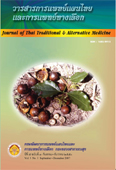Folk Wisdom of Muslim Midwives (Toh-bidae) Practicing in the Five Southern-Border Provinces of Thailand
Main Article Content
Abstract
Infant and maternal mortality rates in the five southern-border provinces of Thailand have been higher than the country’s average. Part of the reasons may be due to the lack of knowledge and skill of toh-bidaes or Muslim midwives in taking care of pregnant women and infants, especially at the time of delivery, in diagnosing any risk factors in labor. The present study was aimed at studying the background and folk medical wisdom of toh-bidaes who practice in the five southern-border provinces of Thailand. The selection criteria for experienced toh-bidaes from different regions of the studied provinces were establisted and three tohbidaes from each province were secured for a total of 15 represent the toh-bidae population. Data from indepth interviews were analyzed for descriptive information. Regarding the background of the toh-bidae samples, they were all women aged 60-70 years. Their main occupations were agriculture and only a few practiced midwifery as their main job. Their midwifery knowledge was passed on from their mothers’ side. Most attended some midwifery training course organized by the public sector. Regarding antenatal care, the toh-bidaes take care of a pregnant woman by examining the baby externally while it is in the womb, giving massage for relaxation, and on the abdomen to correct the position of the baby, if necessary, giving advice on proper diet, especially herbal food, and on nourishing the mother the so that she will have easy delivery. At delivery, the toh-bidae cleans the vaginal area, examines the opening of the uterus, helps deliver the baby, uses some herbs to prevent tearing of the perineum, cuts the cord, and performs ritual while burying the cord. For postnatal care, the toh-bidae takes care of the “Yu-Fai” period (lying by the fire) of the mother to help the uterus resume its original position sooner, and gives self-care instructions for the mother, especially on the use of herbs to help excrete lochia, promote lactation, and nourish the body. For the infant, the toh-bidae performs some ritual to protect them from evil spirits, uses some herbs to help dry the cord and prevent skin rash. In summary, most toh-bidaes inherited their midwifery knowledge from their mothers and grandmothers. Their work involves mainly massage and nutritional support for antenatal care, help in the delivery of the baby, and giving some herbs to stimulate milk production and in taking care of the health of the newborn.


